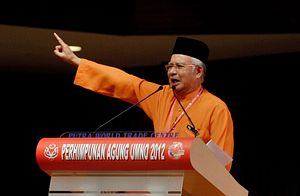In many countries in Southeast Asia, having elections is a meaningless exercise; in the end, the same party always ends up ruling the state.
Malaysia is a prima facie example. The quality of elections in Malaysia has been poor, primarily because of the practices of the ruling Barisan Nasional (BN) coalition. Methods such as gerrymandering, misuse of institutional tools, elite cohesion pacts, and malapportionment have been used to retain power in the past – including by former Prime Minister Mahathir Mohamad, just tapped by the opposition as their candidate. With that in mind, it’s worth looking at what Malaysian leaders have done to cling on to power in the past, while at the same time degrading the sanctity of elections in the region.
Elections in Malaysia have become a one-sided affair over the years. The BN returned to power for the thirteenth time in 2013, and not solely because of the reforms they have carried out in Malaysia. Scholar Kai Ostwald, in his article “How to Win a Lost Election,” argued that methods such as gerrymandering – the manipulation of district boundaries to advantage one party — have been used by the United Malays National Organization (UMNO) to win elections. To create an additional district, the approval of two-thirds of the parliament is required and UMNO has always had a majority in parliament; thus from time to time they have redrawn district boundaries in their favor to capture the maximum number of votes, or to defy votes to the opposition. The fact that, as Ostwald points out, there were only 104 districts in Malaysia at the time of independence compared to 222 in 2013 speaks volumes about gerrymandering and the resulting quality of elections.
In his article, Ostwald has further highlighted the use of malapportionment by the Barisan National coalition to gain seats in the parliament. Malapportionment is the manipulation of electoral district boundaries to the ruling party’s advantage, wherein the pro-government districts have fewer voters and pro-opposition districts have many more.
Some amount of malapportionment is justifiable to improve the relationship between the representative and its constituents, and to give fair representation to Bumiputra people. But its excessive use by the UMNO has made the people lose faith in free and fair elections and derided the quality of it. In 2013, the use of malapportionment led to the incumbent BN winning 54 percent of parliamentary seats while losing the popular vote by a margin of around 4 percent. Ostwald insists that this has violated the “one-person, one vote” principle, that is fundamental to any democratic institution. Thus it has undermined elections at all levels.
This is made possible by a partisan election commission that has refrained from keeping checks and balances over political parties. The election commission is supposed to act as an ombudsperson, but the fact that the head of state appoints the civil servants makes it a prejudiced body. Such practices have hollowed out the essence of elections in Malaysia. Though elections may have been frequent, they have always been well prepared for in advance by the ruling party.
Ostwald looked at the 2013 elections; Jason Brownlee, in his article “Bound To Rule,” explores former Prime Minister Mahathir Mohamad’s practices for dominating both national and inter-party elections in Malaysia. Mahathir faced opposition from some factions of the UMNO in the 1980s. Tengku Razaleigh Hamzah and Musa Hitam, two prominent members of the party, rallied against Mahathir and ran for party president and vice president. To counter this challenge, Mahathir “prevailed by distributing cabinet and party positions to undecided delegation leaders,” according to Brownlee. After he won the elections, however, he got rid of the seven people in his cabinet who were not his supporters.
Later in the decade, Musa decided to run for reelection against the UMNO and gained ample support from his hometown. If Musa had succeeded, it could have been the biggest challenge to Mahathir’s political career. To counter this, Mahathir invited Musa Hitam and Tengku Razaleigh Hamzah to join his cabinet. “Through the party’s organs, Mahathir had wooed Musa and his partisans back before they could compete separately in the next parliamentary elections,” Brownlee explained. However, Mahathir still faced opposition from Razaleigh and his newly formed alliance. This time in 1990, Mahathir dissolved parliament earlier than expected and shortened the campaign time, which caused serious damage to the opposition.
When the outcome is already apparent, elections hardly hold any value. Leaders in Malaysia have exploited the resources of the party and institutions and have made the most important part of democracies, the election, a secondary process.
Gerrymandering, malapportionment, and the misuse of institutional tools are all methods used by the ruling coalition to manipulate the electoral process. This has directly as well as indirectly degraded the quality of elections and has eroded the faith of scholars in the Malaysian electoral system. With Mahathir as the opposition candidate now, it will be interesting to see if this year’s elections will be fair and square or whether the Najib Razak government will degrade the electoral practice to a new low.
Shrish Srivastava is a freelance foreign affairs writer.

































